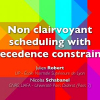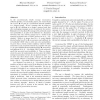103
Voted
SODA
2008
ACM
15 years 3 months ago
2008
ACM
112
Voted
SODA
2008
ACM
15 years 3 months ago
2008
ACM
113
Voted
SODA
2008
ACM
15 years 3 months ago
2008
ACM
98
Voted
SODA
2008
ACM
15 years 3 months ago
2008
ACM
118
Voted
SODA
2008
ACM
15 years 3 months ago
2008
ACM
In the unconditionally reliable message transmission (URMT) problem, two non-faulty players, the sender S and the receiver R are part of a synchronous network modeled as a directe...
127
Voted
SODA
2008
ACM
15 years 3 months ago
2008
ACM
We show how to find a normal form proper equilibrium in behavior strategies of a given two-player zero-sum extensive form game with imperfect information but perfect recall. Our a...
SODA
2008
ACM
15 years 3 months ago
2008
ACM
128
click to vote
SODA
2008
ACM
15 years 3 months ago
2008
ACM
Sleator and Tarjan [39] conjectured that splay trees are dynamically optimal binary search trees (BST). In this context, we study the skip list data structure introduced by Pugh [...
133
click to vote
SODA
2008
ACM
15 years 3 months ago
2008
ACM
We describe an asymptotically optimal data-structure for dynamic point location for horizontal segments. For n line-segments, queries take O(log n) time, updates take O(log n) amo...
113
Voted
SODA
2008
ACM
15 years 3 months ago
2008
ACM
Approximation of the permanent of a matrix with nonnegative entries is a well studied problem. The most successful approach to date for general matrices uses Markov chains to appr...




